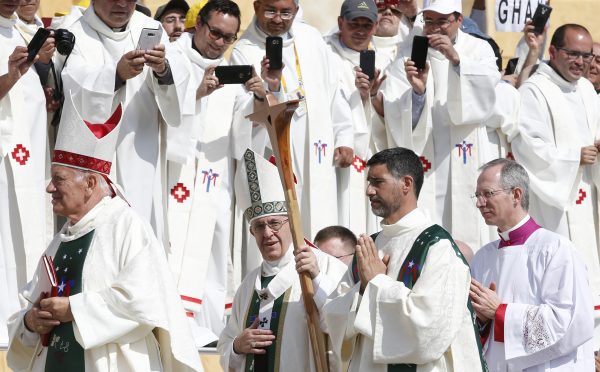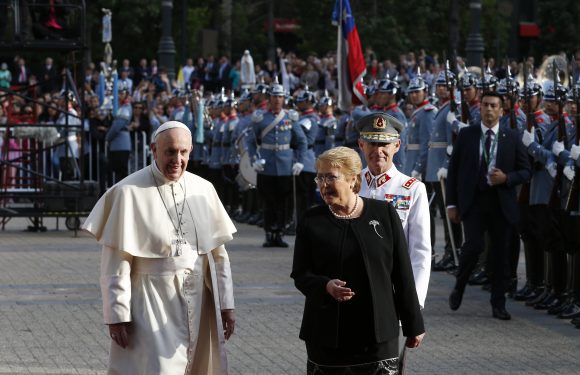By Junno Arocho Esteves

SANTIAGO, Chile (CNS) – Pope Francis, in his first formal speech in Chile, asked forgiveness from those who were sexually abused by priests.
Addressing government authorities and members of the country’s diplomatic corps Jan. 16, the pope expressed his “pain and shame at the irreparable damage caused to children by some ministers of the church.”
“I am one with my brother bishops, for it is right to ask for forgiveness and make every effort to support the victims, even as we commit ourselves to ensure that such things do not happen again,” he said.
Preparations for Pope Francis’ visit to Chile Jan. 15-18 were overshadowed by continuing controversy over the pope’s decision in 2015 to give a diocese to a bishop accused of turning a blind eye to the abuse perpetrated by a notorious priest.
The pope’s appointment of Bishop Juan Barros as head of the Diocese of Osorno sparked several protests – most notably at the bishop’s installation Mass – due to the bishop’s connection to Father Fernando Karadima, his former mentor. Father Karadima was sentenced to a life of prayer and penance by the Vatican after he was found guilty of sexually abusing boys.
The protests against the pope’s appointment of Bishop Barros gained steam when a video of Pope Francis defending the appointment was published in September 2015 by the Chilean news channel, Ahora Noticias. Filmed during a general audience a few months earlier, the video showed the pope telling a group of Chilean pilgrims that Catholics protesting the appointment were “judging a bishop without any proof.”
“Think with your head; don’t let yourself be led by all the lefties who are the ones that started all of this,” the pope said. “Yes, Osorno is suffering but for being foolish because it doesn’t open its heart to what God says and allows itself to be led by all this silliness that all those people say.”
Survivors of abuse and their supporters planned a conference and protests around the pope’s arrival.
But Pope Francis made his way to La Moneda, the presidential palace, and was welcomed by Chilean President Michelle Bachelet. Thousands were gathered in the square outside the palace, chanting “Francisco, amigo, Chile esta contigo” (“Francis, friend, Chile is with you”).
Despite the jovial atmosphere outside La Moneda, there were serious signs of protest in Santiago.
Chilean media reported vandalism at Divine Providence Parish, not far from O’Higgins Park, where the pope celebrated Mass later in the morning. Vandals spray painted the words “complice” (“accomplice”) and “papa arde” (“burn, pope”) on the facade of the church below a banner welcoming Pope Francis.
Three days earlier, several Chilean churches were firebombed, and police found other, unexploded devices at two other churches in Santiago. Some of the pamphlets included the phrase, “The next bombs will be in your cassock” and spoke of the cause of the Mapuche indigenous group.
“How are you? Were you able to rest?” Bachelet asked the pope when he arrived at the palace. “Perfectly,” he responded. The two leaders stood as the national anthems of Chile and Vatican City State were played before entering the courtyard of the palace where about 700 members of the country’s government authorities and of the diplomatic corps welcomed the pope with a standing ovation.
In his speech to the country’s political leaders, Pope Francis emphasized the need for officials to listen to the people and to value their experiences, cultures, sufferings and hopes.
Included in the pope’s list were “children who look out on the world with eyes full of amazement and innocence and expect from us concrete answers for a dignified future.”
At that point he told the officials, “I feel bound to express my pain and shame at the irreparable damage caused to children by some ministers of the church.”
The pope’s acknowledgment of the crimes of sexual abuse committed by members of the clergy was met with a loud applause from the government authorities present.
Looking at the country’s social and political life, Pope Francis congratulated the nation for its steady growth in democracy since 1990 when the rule of Gen. Augusto Pinochet ended.
The recent presidential elections in November, he said, “were a demonstration of the solidity and civic maturity that you have achieved.”
“That was a particularly important moment, for it shaped your destiny as a people founded on freedom and law, one that has faced moments of turmoil, at times painful, yet succeeded in surmounting them. In this way, you have been able to consolidate and confirm the dream of your founding fathers,” the pope said.
Chilean President Michelle Bachelet is scheduled to hand the office over to President-elect Sebastian Pinera in March.
Chile’s future, Pope Francis said, depends on the ability of its people and leaders to listen to those in need and “replace narrow ideologies with a healthy concern for the common good.”
The unemployed, native peoples, migrants, the elderly, young people and children all deserve to be listened to while also giving “preferential attention to our common home.”
The wisdom of the country’s indigenous population, he added, can help Chilean society “transcend a merely consumerist view of life and to adopt a sage attitude to the future.”
“The wisdom of the native peoples can contribute greatly to this,” Pope Francis said. “From them we can learn that a people that turns its back on the land, and everything and everyone on it, will never experience real development.”

Later in the day, a sea of yellow and white flags waved throughout O’Higgins Park as Pope Francis arrived in his popemobile to celebrate Mass with the estimated 400,000 people. By the middle of the Mass, it was 82 degrees. Pilgrims shielded themselves from the sun with ball caps and sun hats.
In his homily, he said the beatitudes are not cheap words for those who think they know it all yet do not commit to faith; they are the fruit of a hopeful heart that yearns for peace and happiness.
Christ’s response to the longings and aspirations of those seeking a life of happiness are not a “product of those prophets of dooms who seek only to spread dismay” or “mirages that promise happiness with a single ‘click,’ in the blink of any eye,” the pope said.
Beatitudes Are Born of Compassion
“The beatitudes are born of the compassionate heart of Jesus, which encounters the hearts of men and women seeking and yearning for a life of happiness,” he said.
Despite several acts of vandalism and protests against the pope’s visit that made headlines in the Chilean capital, there was an atmosphere of joy and hope as crowds sang a traditional Latin American hymn welcoming the pope.
“Together like brothers, members of one church, let us go walking toward the Lord’s encounter,” the faithful sang.
The offertory gifts included a statue of a Moai from Easter Island, sculpted by artist Pau Hereveri Tepano. Some of those present at the Mass traveled the nearly 2,300 miles from Easter Island.
The gifts also included an earthenware piece depicting the Quasimodo, a traditional Chilean procession during Holy Week, when men and women in traditional dress go, on horseback, to give Communion to the sick and elderly who cannot make it to church. A green truck represented the truck that St. Alberto Hurtado used to drive around the community to help the poor.
Reflecting on the Gospel reading from St. Matthew, Pope Francis said Jesus’ proclamation of the beatitudes is the answer to those who seek an encounter with Him.
Jesus’ first act before preaching, the pope said, was to “look out and see the faces of his people.”
“Those faces awaken God’s visceral love. Jesus’ heart was not moved by ideas or concepts but by faces, persons. By life calling out for the life that the Father wants to give us,” he said.
The people of Chile, he added, know about rebuilding. They continue to “get up again after so many falls.”
“This is the heart to which Jesus speaks; that is the heart for which the beatitudes are meant,” the pope said.
By proclaiming the poor, those who mourn and the afflicted as blessed, Jesus “shakes us out of that negativity” and “the sense of resignation that tends to isolate us from others.”
Christians, the pope said, are also called to be peacemakers and work for reconciliation.
